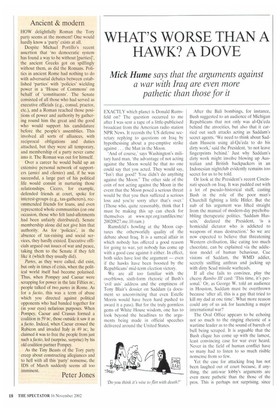Ancient & modern
HOW delightfully Roman the Tory party seems at the moment! One would hardly know a 'party' exists at all.
Despite Michael Portillo's recent assertion that no democratic system has found a way to be without [parties]', the ancient Greeks got on spiffingly without them, as did the Romans. Politics in ancient Rome had nothing to do with adversarial debates between established 'parties' with 'policies' wielding power in a 'House of Commons' on behalf of 'constituents'. The Senate consisted of all those who had served as executive officials (e.g., consul, praetor, etc.), and a Roman reached those positions of power and authority by gathering round him the great and the good who would support his candidature before the people's assemblies. This involved all sorts of alliances, with reciprocal obligations and duties attached, but they were all temporary, and membership of a party never came into it. The Roman was out for himself.
Over a career he would build up an extensive personal network of supporters (amici and clientes) and, if he was successful, a large part of his political life would consist in nurturing those relationships. Cicero, for example, defended friends at court, spoke for interest-groups (e.g., tax-gatherers), recommended friends for loans, and even represented whole communities (on one occasion, those who felt land-allotments had been unfairly distributed). Senate membership alone did not give him that authority. As for 'policies', in the absence of tax-raising and social services, they hardly existed. Executive officials argued out issues of war and peace, taking them to the Senate if they felt like it (which they usually did).
Panes, as they were called, did exist, but only in times of crisis, when the political world itself had become polarised. Thus, when Pompey and Caesar were scrapping for power in the late Fifties BC, people talked of two panes in Rome. As for a factio, this was a term of abuse which you directed against political opponents who had banded together for (in your eyes) nefarious purposes. When Pompey. Caesar and Crassus formed a coalition in 59 pc, those outside it saw it as a factio. Indeed, when Caesar crossed the Rubicon and invaded Italy in 49 BC, he claimed it was to free the people from just such a factio, led (surprise, surprise) by his old coalition partner Pompey.
As the Tiny Beasts of the Tory party creep about constructing allegiances and to hell with all this 'party' nonsense, the IDS of March suddenly seems all too
imminent. Peter Jones


























































































 Previous page
Previous page